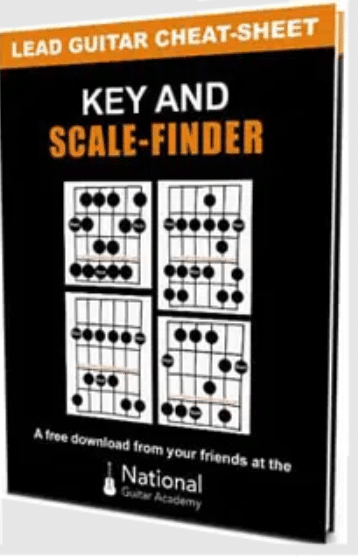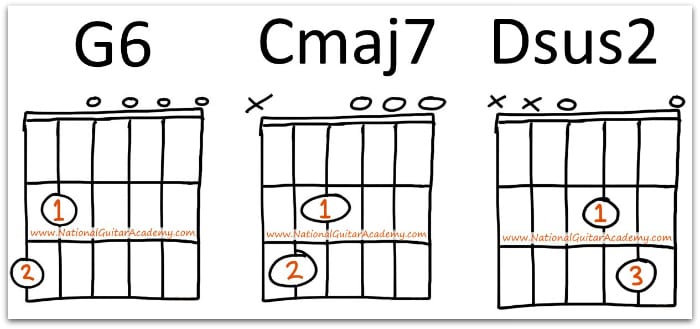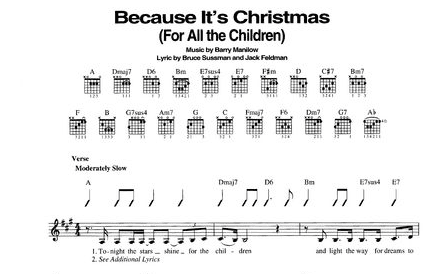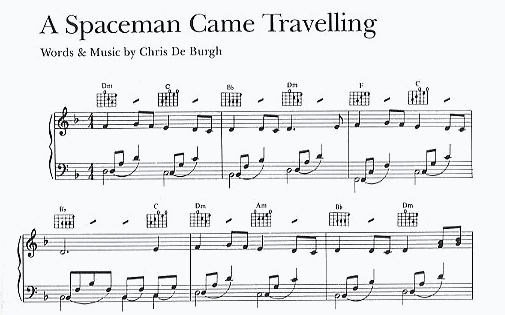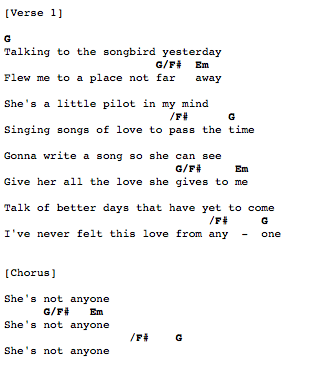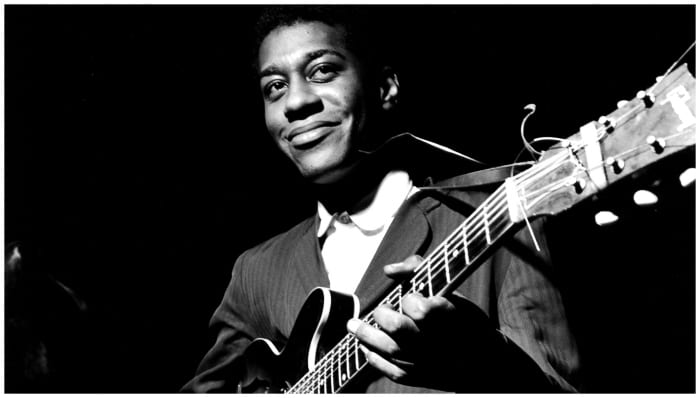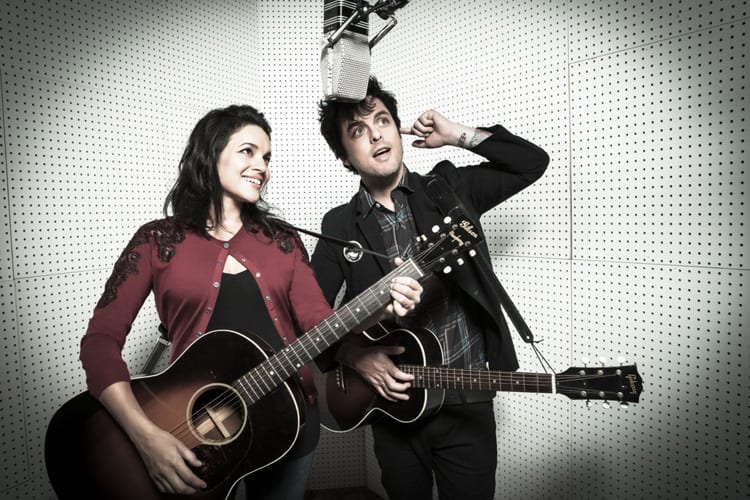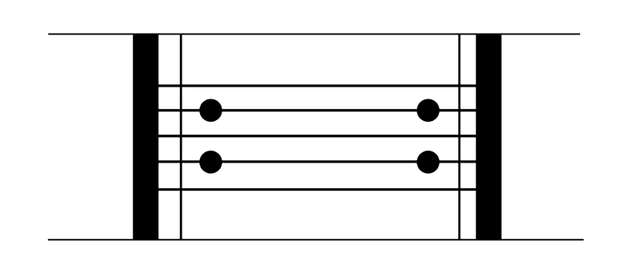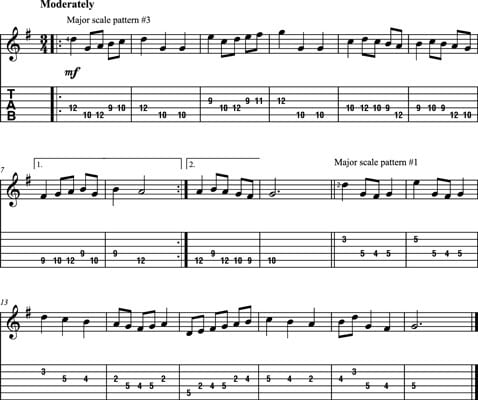Want to know how to play guitar songs? You’re in the right place!
In this free guitar lesson you will learn:
- 2 essential tips that will enhance your chord reading skills.
- A 5 step guide which will help you learn guitar songs quickly.
- 3 must-know strumming lessons that will enhance your musicality.
- The secrets of guitar tab.
Over 100,000 guitar-learners get our world-class guitar tips & tutorials sent straight to their inbox:
Click here to join them
Get our best guitar tips & videos
How To Play Guitar Songs #1 How Guitar Songs Are Written
You may have noticed that the way songs are often written out for guitar is quite different to how they’re written out for other instruments.
We often don’t have sheet music for a start.
Broadly, guitar playing can be divided into two camps: chord playing and melody/riff playing.
The former is called rhythm guitar and the latter is called lead guitar.
We’re going to look at rhythm guitar first.
Want free guitar tips and video lessons delivered to your inbox?
Join over 100,000 guitar learners and subscribe to our guitar-tips-by-email service. (It's free.)
We'll send you a series of lessons that will move you to the next level of your guitar journey.
Learn how everything fits together quickly, easily and effectively. We share ninja tips (for instant fun!) but also timeless fundamentals that will deepen your understanding.


Get our best guitar tips & videos
Our Guitar Courses
To become a better guitarist click here to see our guitar courses
Get your personalised guitar-learning plan 🎸
Want us to make a guitar-learning plan that is customised to you? Click here for GuitarMetrics™
How To Play Guitar Songs #2 Learn To Read Chords
If we’re going to play chords, obviously we need to know how to read chords.
Chords are usually written out for us in diagrams that look a bit like this:
These diagrams are called chord boxes.
(If you don't understand the above image please read our article "How To Read Guitar Chordboxes In 60 Seconds". It will make everything clear!)
Let’s break each image down:
- The vertical lines in these diagrams represent our strings.
- The horizontal lines represent our frets.
- The circles with numbers in tell us where our fingers go.
- Strings marked ‘X’ are not played.
- Strings marked ‘O’ are played open (ie. not fretted).
You will usually find a layout of all the chords in a song at the top of the page.
Other times, the chord boxes are written as and when the chord occurs in the song. This is especially common in piano music. For example:
There are pros and cons to both.
If the chord boxes are all written at the beginning of the song sheet, you’ll need to make sure you have them all learned before you start having a go at the song, otherwise you’ll have to keep referring back to the top of the page.
If you want to learn how to play guitar songs from a book, it’s best to pick a book that’s written specifically for guitarists, not a book written for pianists that happens to feature guitar chords as a bonus.
A lot of the time, guitar songs are written out as lyric sheets with the guitar chords written above the words like this example (‘Songbird’ by Oasis):
This can be quite handy, as it means we can use the words as a helpful guide as to where to change chords, be warned though, some internet song sheets suffer from justification.
By this we mean that the chords and lyrics may get knocked out of sync with one another.
If you buy a chord songbook from a music shop instead of looking for song sheets on the internet, the words and chords are most likely to be in the right places.
This sort of layout is perfect for people who are looking to both play and sing the songs they’re learning, though even if you’re not a singer, singing the words along (even badly!) will help you know when to change chords.
Here’s a solid step-by-step guide for learning how to play guitar songs:
- Find out what the chords of the song are.
- Learn those chords.
- Practice changing between those chords.
- Learn to strum those chords in a way that’s suitable for the song.
- Practice the song along to the record.
How To Play Guitar Songs #3 Strumming
Using a song sheet is perfect for identifying chord changes, however it doesn’t tell you WHAT to strum.
Strumming is what makes your chords come alive!
By far the best way to figure out how to strum the chords of a song is to listen to the song and copy the strumming by ear.
It’s important to note though that what we are trying to capture the ‘feel’ of the song, not a strum-by-strum carbon copy recreation of the record.
The former is a fun and straight forward way of learning to strum a song that allows you to add a bit of your own personality into it.
The latter is a very long winded and largely pointless exercise.
Try not to get lost in how many down strokes and how many up strokes you should be playing and instead focus on playing something that feels right and sounds right.
To learn more about strumming, go here: How To Strum A Guitar Correctly
This all very much ties in with playing the song along with the original record.
There’s no better way to know whether or not what you’re playing is in time by playing along with the record.
✅ Stop struggling. Start making music. ✅ Learn beginner-friendly versions of every chord. This is our most popular guide and it will improve your chord ability quickly! 😎 Get a custom guitar-learning plan here: Click here for GuitarMetrics™ Learn from the world's best guitar educators: Click here for our guitar coursesLearn 12 EASY beginner chords with our popular guide
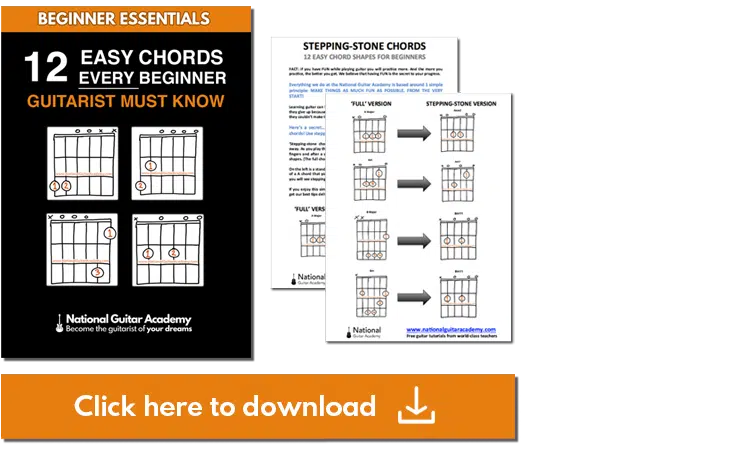
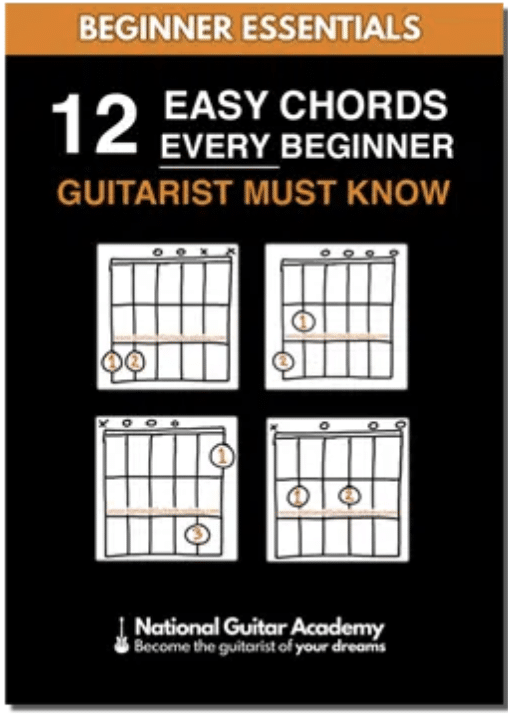
Where should we send it?
Get your own personalised guitar-learning plan 🎸
World-Class Guitar Courses 🌎
How To Play Guitar Songs #4 Tablature
Sometimes chords are written using tablature instead of using chord boxes.
To learn more about guitar tabs, go here: How To Read Guitar Tabs
How To Play Guitar Songs #5 How Lead Guitar Is Written
As mentioned earlier, lead guitar is where we play melodies or riffs or basically anything that uses (mostly) single notes rather than full chords.
Obviously chord boxes aren’t going to be any use to us for this sort of thing.
Instead, we need to use tab.
Here’s a classic example of a tab:
Notice what we have here is lines and numbers.
We have six lines, each of these represent our guitar strings.
The lowest string in the tab represents our low E string (the thickest string on the guitar).
Not sure which string is which? Check out this article for some help: Guitar String Notes – The Ultimate Guide
What about the numbers? As well as knowing which strings to play, we also need to know which fret to press those strings down at so that’s what the numbers are for.
So if we see a number ‘2’ on the ‘A’ string in the tab, this means we press the A string down at the second fret and play it.
If a string has a ‘0’ written on it, this means we play it open. We can think of this either as ‘0’, meaning zero frets or as simply ‘o’ for open.
Why not just use normal sheet music?
Sheet music is good for what it is, but it doesn’t lend itself that well to guitar playing.
That’s why most guitarists prefer to use tab and chord boxes when learning how to play guitar songs.
They’re simpler and more straightforward.
Sheet music will tell us what note to play and how long that note lasts, but it won’t tell us where to find that note on the guitar, which is what we need to know.
Chord boxes and tab will tell us exactly where our fingers need to go.
One thing chord boxes and tab don’t tell us though is the rhythm of the song we’re learning.
To figure that out, we need to listen to the record and learn it by ear as we discussed in our section on strumming.
If you’re a beginner guitarist who already plays another instrument and can already read standard sheet music, a lot of tabs (the more professionally transcribed ones) come with sheet music as well, so you can always get the rhythm from the sheet music and the fingering from the tab.
If you’re particularly interested in why guitarists generally don’t read standard sheet music, here is a somewhat more in-depth article from Woodpecker Media on the subject: Why Guitarists Can’t Read Music
How To Play Guitar Songs #6 Song Structures
When we talk about the structure of a song, we’re talking about how many times we play each part and where we play each part.
For example, a song could go: verse / chorus / verse / chorus / verse / chorus
Or it could go: verse / verse / chorus / verse / chorus / verse / chorus
Or: verse / bridge / chorus / verse / bridge / chorus
Or: verse / chorus / verse / chorus / middle 8 / verse / chorus
Some structures are easier to follow than others, and of course, there’s no rule that says someone can’t write a song with an unusual or tricky structure.
If the chorus of a song is the same every time, chances are the person writing the song out won’t bother writing it out every time.
Instead they’ll just write something like: “chorus 2 (as chorus 1)“.
In a tab with sheet music, you may see markers like this at the beginning and end of certain sections:
This simply means we play that section again.
This both saves the person transcribing the song from having to write the same bit out again.
Sometimes there might be an instruction such as “play 3 times” written just after such a section.
Obviously if we see this it means we play that section three times in total. If there’s no such instruction then we are to assume we just play the section twice.
Join over 100,000 guitar learners and subscribe to our guitar-tips-by-email service. (It's free.) We'll send you a series of lessons that will move you to the next level of your guitar journey. Learn how everything fits together quickly, easily and effectively. We share ninja tips (for instant fun!) but also timeless fundamentals that will deepen your understanding. To become a better guitarist click here to see our guitar courses Want us to make a guitar-learning plan that is customised to you? Click here for GuitarMetrics™Want free guitar tips and video lessons delivered to your inbox?


Get our best guitar tips & videos
Our Guitar Courses
Get your personalised guitar-learning plan 🎸
First and second time endings
Sometimes there is a slight variation in the ending of a repeated section.
To save the transcriber from having to transcribe the whole thing again just for the sake of this slightly different ending they sometimes use markings like this:
See how the last two bars of the repeated section are marked with a number ‘1’ and the bar just after the repeat section is marked with a number ‘2’?
This tells us to replace the last two bars of the section with the bar marked ‘2’ on the second time around.
D.C. al Coda and D.S. al Coda
These are instructions you may see sometimes in guitar tabs.
So, what on Earth do they mean?
Firstly, let’s explain what a ‘coda’ is.
A coda is simply the end bit of a song. Sometimes called an ‘outro’.
If we see the instruction: D.C. al Coda This means that we are to return to the beginning of the piece of music and play until we see the instruction: to coda, then we play the coda.
It’s simply a way of repeating the beginning bit of a song before playing the outro.
NB: A coda is either simply labelled ‘coda’ or it is marked with this symbol:
So what about D.S. al Coda?
D.S. al Coda is the same principle, except instead of returning to the beginning of the song, we return to wherever the ‘S’ marker is written.
This is what it actually looks like:
So if we see the instruction D.S. al Coda, we go to where this symbol is and then play until it says ‘to coda’,then we play the coda.
What about D.C. al fine and D.S al fine?
If you see ‘al fine’ instead of ‘al coda’ it’s the same principle except we don’t have a coda, so we just return to either the beginning (D.C) or the S symbol (D.S) and then play ’til it says ‘fine’. Then we finish.
Still a bit confused?
It can take a little while to get your head around this kind of stuff, so take your time with it.
To be honest, one of the best ways to figure out the structure of a song is to listen to the song and simply count how many times you hear each bit.
There’s nothing wrong with getting a piece of paper out and writing “first riff x 4; second riff x 2” or similar on it if that’s what works for you.
This is one of the benefits of practicing along with the record. It helps us pick up the structure.
Take our 60-second quiz & get your results: Take The Quiz Click here to learn more about National Guitar Academy membership Look cooler! Check out our merch: Click here to see our merch store Join over 100,000 guitar-learners and subscribe to our guitar-tips-by-email service. (It's free.) We'll send you a series of lessons that will move you to the next level of your guitar journey. Learn how everything fits together quickly, easily and effectively. We share ninja tips (for instant fun!) but also timeless fundamentals that will deepen your understanding.What Type of Guitarist Are You?
Join the world's best online guitar school 🌎
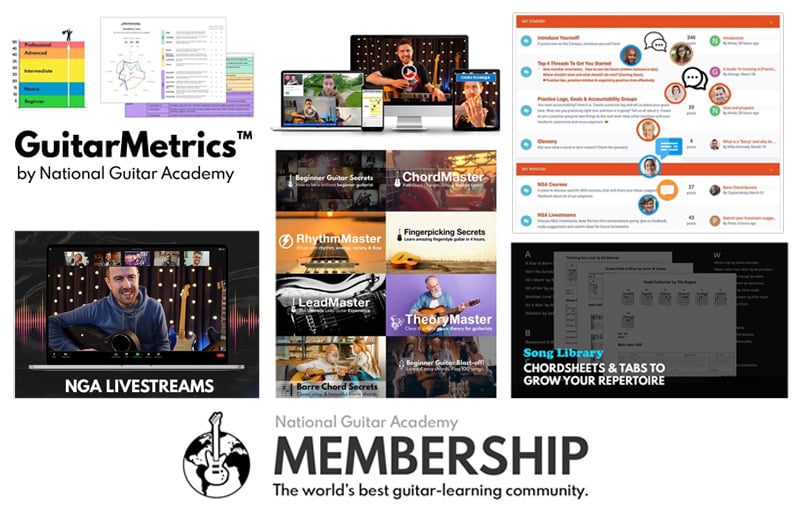
Cool Guitar T-shirts 😎
Want free guitar tips and video lessons delivered to your inbox?


Get our best guitar tips & videos
How To Learn Guitar: An 11-Step Programme For Beginners How To Choose The Perfect Beginner Guitar Learn about National Guitar Academy: About Us Join us on Facebook for daily guitar tips. Listen to our Learn Guitar Podcast for rapid guitar progress. Check out our free chord lessons.Popular Lessons
More Cool Guitar Stuff

